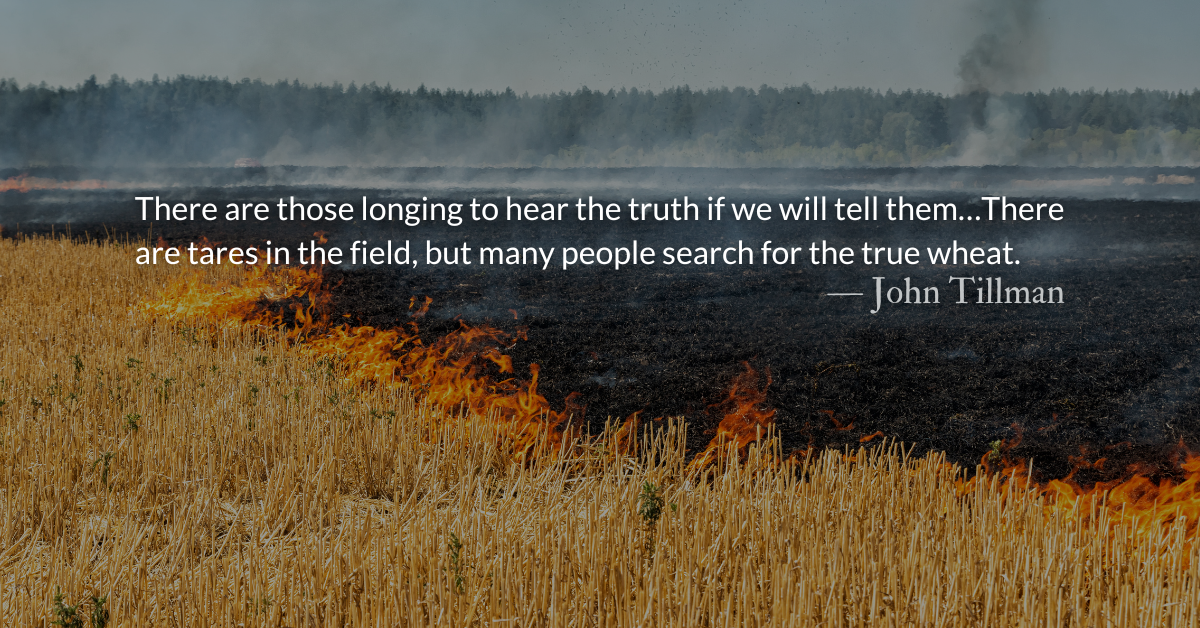Scripture Focus: Proverbs 18.14-15
14 The human spirit can endure in sickness,
but a crushed spirit who can bear?
15 The heart of the discerning acquires knowledge,
for the ears of the wise seek it out.
Matthew 13.30
30 Let both grow together until the harvest. At that time I will tell the harvesters: First collect the weeds and tie them in bundles to be burned; then gather the wheat and bring it into my barn.
Reflection: Tares Will Burn
By John Tillman
It crushes the spirit and sickens the heart when evil returns and seems unopposed.
Recently in American cities, Nazis openly marched and chanted in the streets, referring to non-white people as feces and vermin.
Over 400,000 Americans died defeating the Nazi empire, yet today, Hitler’s flags and slogans in American streets brought shrugs from some politicians, media personalities, and Christians. “Are they really Nazis? Did anyone interview them to find out what they want?” As if we couldn’t listen to the chants, read the flags, or remember what Nazis want.
In the 1930s, Nazi ideology twisted and manipulated Christianity and the Bible into an explicitly anti-Christian mandate of hate. Nazi ideology was defeated by those who reclaimed Christianity from hatred, kinism, and fascism. Yet today, some think fascism might not be so bad, and some Christians have pulled Nazi definitions of Christendom from the trash heap of history and are reheating them on a stove to serve their followers.
Who can endure when sickness such as this returns and returns? How can our spirits not be crushed to witness moral and theological failure? To what can we appeal when those supporting hatred, violence, and oppression slander the very name of Christ?
There have always been tares among the wheat, false gospels among the true, and false Christs posing as “saviors” of the church or Christianity.
There is no glib proverb promising such things cannot happen in our time. There’s no easy answer other than proclaiming the truth. There’s no course of action other than staying the course in the way of Jesus.
There is good news. First, this evil is not unopposed. Don’t become distracted by Christian voices deceived by or apathetic to kinism and racism. Lend your voice to those who cry against such things.
We may be embarrassed by the arguments between Christians about whether it is bad that Nazis are marching or not. We may be disappointed or disillusioned by the failures of leaders or organizations to confront false Christendoms, false gospels, and false messiahs that promote them.
However, there are those longing to hear the truth if we will tell them. The heart of the discerning longs to acquire knowledge. The ears of the wise are seeking the truth.
There are tares in the field, but many people search for the true wheat. And someday, those tares will burn.
Divine Hours Prayer: The Morning Psalm
Lord, who may dwell in your tabernacle? Who may abide upon your holy hill?
Whoever leads a blameless life and does what is right, who speaks the truth from his heart.
There is no guile upon his tongue; he does no evil to his friend; he does not heap contempt upon his neighbor.
In his sight the wicked is rejected, but he honors those who fear the Lord.
He has sworn to do no wrong and does not take back his word.
He does not give his money in hope of gain, nor does he take a bribe against the innocent.
Whoever does these things shall never be overthrown. — Psalm 15
– From The Divine Hours: Prayers for Summertime by Phyllis Tickle.
Today’s Readings
Proverbs 18 (Listen 2:23)
Mark 8 (Listen 4:29)
Read more about Breathing Prayers
Breath prayers are simply short prayers which can be said “in a breath.” These are often taken from scripture.
Read more about A Sword Unsheathed
May we cry against violence not cry for it.
May we end the suffering of the poor not endorse it.






